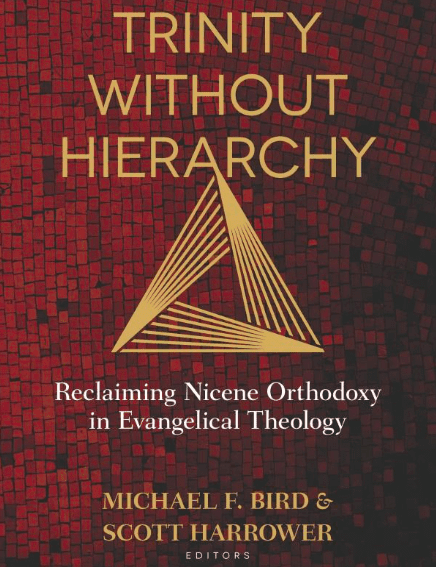 In their new book, Michael Bird and Scott Harrower (Trinity without Hierarchy: Reclaiming Nicene Orthodoxy in Evangelical Theology,) collect essays that both criticize what must be called a Complementarian sub-Trinitarianism and they also offer an alternative in the classical Trinitarian orthodoxy of the church.
In their new book, Michael Bird and Scott Harrower (Trinity without Hierarchy: Reclaiming Nicene Orthodoxy in Evangelical Theology,) collect essays that both criticize what must be called a Complementarian sub-Trinitarianism and they also offer an alternative in the classical Trinitarian orthodoxy of the church.
This is an important book. Well done. Short essays on targeted topics.
One of the early essays is by Madison Pierce and it’s big contention is that the Trinity does not have tiers (as some complementarians have argued) but there is an order (taxis in Greek). It’s a well-argued article that could easily have been triple the length.
Pro-Nicene theology is incompatible with the Son’s eternal subordination (39). She’s right. After a brief sketch of options on reading 1 Corinthians 11 and then criticizes briefly the view of Kyle Claunch who claims the economic Trinity, in that it reveals the immanent Trinity, must have some correlation in subordination in the immanent Trinity. She contends he permits this to override pro-Nicene theology.
Yet, there is taxis in the Trinity: pro-Nicene theology has a place for the primacy of the Father (“first”). The Father generates Son and spirates Spirit. They are equal in essence but differ in procession. Not ranked, however.
She examines kephale, or “head” and concludes neither authority over or source of are good enough and that the term means “preeminent, prominent” in some way. As first. The worship context of 1 Cor 11 is not about authority. (This could take some more discussion.)
She concludes with this:
Although traditional understandings of 1 Corinthians 11 argue that hierarchy is the primary dynamic in the three relationships (Christ-man; man-woman; God-Christ), a critique of previous interpretations paired with a reconsideration of the lexical form kephale and pro-Nicene categories reveal something to the contrary. Paul describes three ordered relationships, where one has preeminence over the other, but without the explicit interplay of authority and submission. If Paul indeed describes an ordered, mutual relations between God and Christ, then this mirrors later Christian articula tions of the Trinity in terms of taxis. This concept paired with redoublement and an understanding of relationality and Pauline God-language reveal unity and yet distinction between Father and Son. With this, Paul seems to describe a Trinity without tiers, but not a Trinity without taxis.










